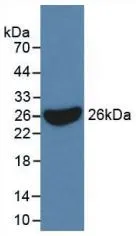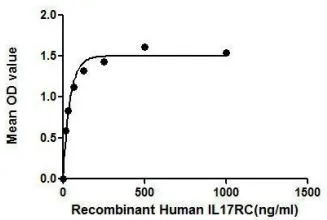
WB analysis of GTX00143-pro Human IL17 Receptor C protein.
Human IL17 Receptor C protein, His tag
GTX00143-PRO
ApplicationsFunctional Assay
Product group Proteins / Signaling Molecules
Protein IDQ8NAC3
Overview
- SupplierGeneTex
- Product NameHuman IL17 Receptor C protein, His tag
- Delivery Days Customer9
- Application Supplier NoteIL17RC (Interleukin-17 receptor C) is a receptor for IL17A and IL17F homodimers as part of a heterodimeric complex with IL17RA. This protein is expressed in nonhemopoietic tissues, and binds both IL-17A and IL-17F with similar affinities. A binding ELISA assay was conducted to detect the association of IL17RC with IL17RA. Briefly, IL17RC were diluted serially in PBS with 0.01% BSA (pH 7.4). Duplicate samples of 100 microl were then transferred to IL17RA-coated microtiter wells and incubated for 2h at 37C. Wells were washed with PBST and incubated for 1h with anti-IL17RC pAb, then aspirated and washed 3 times. After incubation with HRP labelled secondary antibody, wells were aspirated and washed 3 times. With the addition of substrate solution, wells were incubated 15-25 minutes at 37C. Finally, add 50 microl stop solution to the wells and read at 450nm immediately. The binding activity of IL17RC with IL17RA was in a dose dependent manner.
- ApplicationsFunctional Assay
- CertificationResearch Use Only
- ConjugateUnconjugated
- Protein IDQ8NAC3
- Protein NameInterleukin-17 receptor C
- Scientific DescriptionThis gene encodes a single-pass type I membrane protein that shares similarity with the interleukin-17 receptor (IL-17RA). Unlike IL-17RA, which is predominantly expressed in hemopoietic cells, and binds with high affinity to only IL-17A, this protein is expressed in nonhemopoietic tissues, and binds both IL-17A and IL-17F with similar affinities. The proinflammatory cytokines, IL-17A and IL-17F, have been implicated in the progression of inflammatory and autoimmune diseases. Multiple alternatively spliced transcript variants encoding different isoforms have been detected for this gene, and it has been proposed that soluble, secreted proteins lacking transmembrane and intracellular domains may function as extracellular antagonists to cytokine signaling. [provided by RefSeq, Feb 2011]
- Storage Instruction-20°C or -80°C,2°C to 8°C
- UNSPSC12352202




